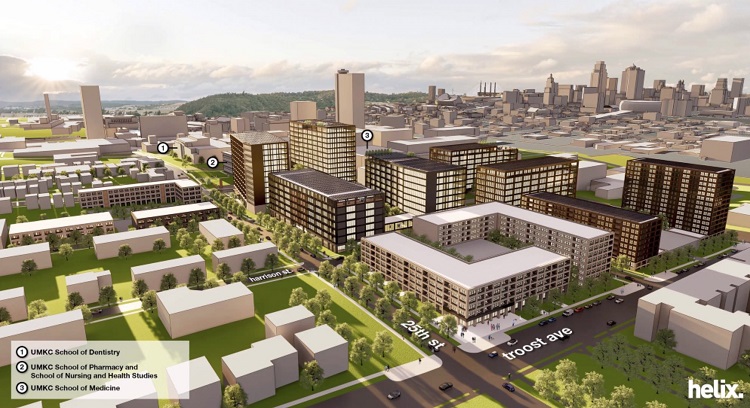New multi-story building will expand classrooms and teaching clinics, spur research and development
The University of Missouri-Kansas City is poised to begin work on a new interprofessional health sciences building in the UMKC Health Sciences District, housing new, state-of-the-art dental teaching clinics and expanded medical school teaching facilities.
The multi-story, $100 million project also will serve as a home for the university’s Data Science and Analytics Innovation Center and Biomedical Engineering program. This project will take the Health Sciences District to the next level, accelerating health care access and equity for the community and sparking development to turn the campus into a regional draw, igniting entrepreneurship and economic growth for the city and region.
The state of Missouri has appropriated $40 million for the building in legislation signed by Gov. Mike Parson on July 1. This appropriation comes with a challenge to the Kansas City community to raise the additional $60 million to build the $100 million project.
The project has broad and enthusiastic support from the City of Kansas City, Jackson County and multiple business, civic and economic development organizations. The project will add impact and momentum to the burgeoning growth underway in the district – including recent additions such as Children’s Mercy Kansas City’s $200 million Research Institute tower, the $70 million University Health 2 medical office building and the $45 million University Health 1 building.
Civic leaders view the UMKC project as a next step toward the launch of a comprehensive development plan for the district.
“A united medical and dental building will be a signature facility, as there is only one such institution in the country with this combined learning and clinical environment,” said Chancellor Mauli Agrawal. “The project will spark an expansion of the entire UMKC Health Sciences District that could dramatically expand health care in Kansas City, attract top faculty and researchers and new private investment that could create new jobs and eventually contribute billions to the Kansas City economy.”
Academic medical centers in San Antonio, Memphis and Denver, among others across the country, have transformed districts with an estimated multibillion regional economic impact annually.
Additionally, an interprofessional health building allows for increased collaboration among health care fields, which creates a greater capacity for developing health solutions and providing patient care. UMKC is one of only 20 universities in the country where dentistry, medicine, nursing and health studies, and pharmacy share a single, walkable campus, which underscores the need to continue to provide opportunities for collaboration among the health sciences.
UMKC will occupy the first several floors of the project and additional floors may be available to public partners for medical office space, clinical space and other uses. Here’s what will be housed in the UMKC space:
School of Dentistry
These state-of-the-art clinics will attract some of the best students and faculty from the region, making UMKC competitive with top schools across the country. In addition, UMKC will have increased space to continue its important work in serving the underserved – delivering almost $1 million in uncompensated care to those who otherwise might not get treatment. With a new interprofessional medical building, the next generation of dentists can be taught to deliver better dental care at a lower cost. Another benefit will be the expansion of dental emergency services, which will lower the number of dental emergencies seen at hospital emergency rooms and continue to make first-rate dental care more accessible to the community.
School of Medicine
The new building will provide state of the art educational facilities for UMKC medical students and programs, such as space for more simulation labs, which lead to better training for students and better care for the community. The expansion also will allow for necessary infrastructure changes to improve the school, including increased capacity for digitization with additional space for fiberoptic cables, improved air flow throughout the building and expanded classroom space.
Biomedical Engineering
Proximity between doctors and developers of medical devices is paramount, and this new building will foster faster, more effective collaboration between engineers and medical professionals to accelerate product development in areas such as imaging technology, implants and microsurgery tools. UMKC will expand its ability for creating new technology, generating innovations for products and patents with the potential to work with companies to develop and produce them.
Data Science and Analytics Innovation Center
Through its expertise in data science, UMKC and its clinical partners are ushering forward a new era of personalized health care — one that will treat diseases based on individual variability in genes, environment and lifestyle, rather than a traditional one-size-fits-all approach. The data center’s work will drive innovation in a variety of domains, ranging from health care and business intelligence to agriculture and digital humanities.

